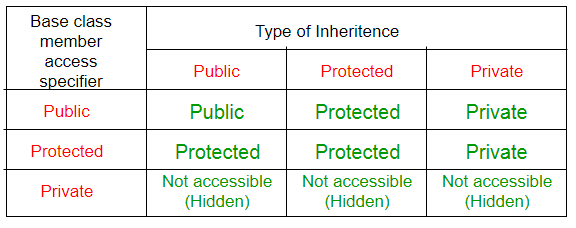C++ Quick Reference
Inhertance
// C++ Implementation to show that a derived class
// doesn’t inherit access to private data members.
// However, it does inherit a full parent object
class A
{
public:
int x;
protected:
int y;
private:
int z;
};
class B : public A
{
// x is public
// y is protected
// z is not accessible from B
};
class C : protected A
{
// x is protected
// y is protected
// z is not accessible from C
};
class D : private A // 'private' is default for classes
{
// x is private
// y is private
// z is not accessible from D
};

virtual
Runtime polymorphism
class Base{
public :
virtual void show(){ cout<<"base"; }
}
class Derived : Base{
public :
void show(){ cout<<"derived"; }
}
int main(){
Base * b = new Derived();
b->show(); // "derived"
}
class base1
{
public:
void someFunction( )
{ .... ... .... }
};
class base2
{
void someFunction( )
{ .... ... .... }
};
class derived : public base1, public base2
{
};
int main()
{
derived obj;
obj.someFunction() // Error!
}
There are 2 ways to avoid ambiguity:
- Use scope resolution operator // multiple inhertance
- Use virtual base class // multipath inhertance
The diamond problem occurs when two superclasses of a class have a common base class. here the constructor and destructor will be called twice. So object ‘grandchild’ has two copies of all members of ‘grandParent’, this causes ambiguities. solved with virtual base class
class Faculty : virtual public Person { ...
To implement virtual functions, C++ uses a special form of late binding known as the virtual table. The virtual table is a lookup table of functions used to resolve function calls in a dynamic/late binding manner. The virtual table sometimes goes by other names, such as “vtable”, “virtual function table”, “virtual method table”, or “dispatch table”.
Exception
In C++, all exceptions are unchecked, so it is not forced by the compiler to either handle or specify the exception.
Pointers
Pointer is a variable in C++ that holds the address of another variable. They have data type just like variables, for example an integer type pointer can hold the address of an integer variable and an character type pointer can hold the address of char variable.
The size of a pointer in C/C++ is not fixed. It depends upon different issues like Operating system, CPU architecture etc. Usually it depends upon the word size of underlying processor for example for a 32 bit computer the pointer size can be 4 bytes for a 64 bit computer the pointer size can be 8 bytes
smart pointers
smart pointers are wrapper classes of pointers used to automatically delete pointers when variable goes out of scope. we can create our own smart pointer class by overloading * and -> operator and deleting the pointer in destructor of the class (which is automatically called when object goes of out scope). impemented by std::unique_ptr
Threading and Fork
use std::thread for multithreading
void foo(param)
{
// Do something
}
// The parameters to the function are put after the comma
std::thread thread_obj(foo, params);
//we can also override () operator and pass
class fn_object_class {
// Overload () operator
void operator()(params)
{
// Do Something
}
}
std::thread thread_object(fn_class_object(), params)
t1.join(); // wait for t1 to finish
fork() call is used to create a new process. all instructions after the call are executed in both parent and child processes. In parent fork() return pid of child process or -ve number if failed In child fork() returns zero
Mutex
https://stackoverflow.com/a/5154174/12613203
#include <iostream>
#include <thread>
#include <mutex>
std::mutex m;//you can use std::lock_guard if you want to be exception safe
int i = 0;
void makeACallFromPhoneBooth()
{
m.lock();//man gets a hold of the phone booth door and locks it. The other men wait outside
//man happily talks to his wife from now....
std::cout << i << " Hello Wife" << std::endl;
i++;//no other thread can access variable i until m.unlock() is called
//...until now, with no interruption from other men
m.unlock();//man lets go of the door handle and unlocks the door
}
int main()
{
//This is the main crowd of people uninterested in making a phone call
//man1 leaves the crowd to go to the phone booth
std::thread man1(makeACallFromPhoneBooth);
//Although man2 appears to start second, there's a good chance he might
//reach the phone booth before man1
std::thread man2(makeACallFromPhoneBooth);
//And hey, man3 also joined the race to the booth
std::thread man3(makeACallFromPhoneBooth);
man1.join();//man1 finished his phone call and joins the crowd
man2.join();//man2 finished his phone call and joins the crowd
man3.join();//man3 finished his phone call and joins the crowd
return 0;
}
Free and Delete
delete operator should only be used either for the pointers pointing to the memory allocated using new operator or for a NULL pointer, and free() should only be used either for the pointers pointing to the memory allocated using malloc() or for a NULL pointer.
- When the delete operator destroys the allocated memory, then it calls the destructor of the class in C++, whereas the free() function does not call the destructor; it only frees the memory from the heap.
- The delete operator is faster than the free() function.
Syntax
input cin>>x;
output cout<<x;
Arrays
int a[10];
int arr[] = {1,2,3,4}; //creates arr of size 4
int arr[6] = { 10, 20, 30, 40 }; //creates an array of size 6, initializes first 4 elements
Vector
vector<int> vec;
.push_back() //append
.pop_back() //remove last
.back() //get last ele
.front() //get first ele
.clear() //removes all : o(n)
.resize(int capacity, int val)
.erase(iterator) // removes 1 ele : o(n)
.erase(fromItr, toItr) // remove range of ele : o(n)
Lists
non contiguous
list <int> mlist;
.push_back() //append
.pop_back() //remove last
.push_front()
.pop_front()
.back() //get last ele
.front() //get first ele
.clear() //removes all : o(n)
.resize(int capacity, int val)
.erase(iterator) // removes 1 ele : o(n)
.erase(fromItr, toItr) // remove range of ele : o(n)
Maps
unordered_map<string, int> umap;
map<int, int> gquiz1;
.insert({first,second}) // o(1) / o(logn)
.erase(key) // o(1) / o(logn)
.find(key) return itr // o(1) / o(logn)
Sets
unordered_set <string> stringSet ;
set <int, greater <int> > s1 // default increasing;
.insert({first,second}) // o(1) / o(logn)
.erase(key) // o(1) / o(logn)
.find(key) return itr // o(1) / o(logn)
Files
fstream myfile("./input.txt", ios_base::in | ios_base::out);
ios_base::app // append mode


